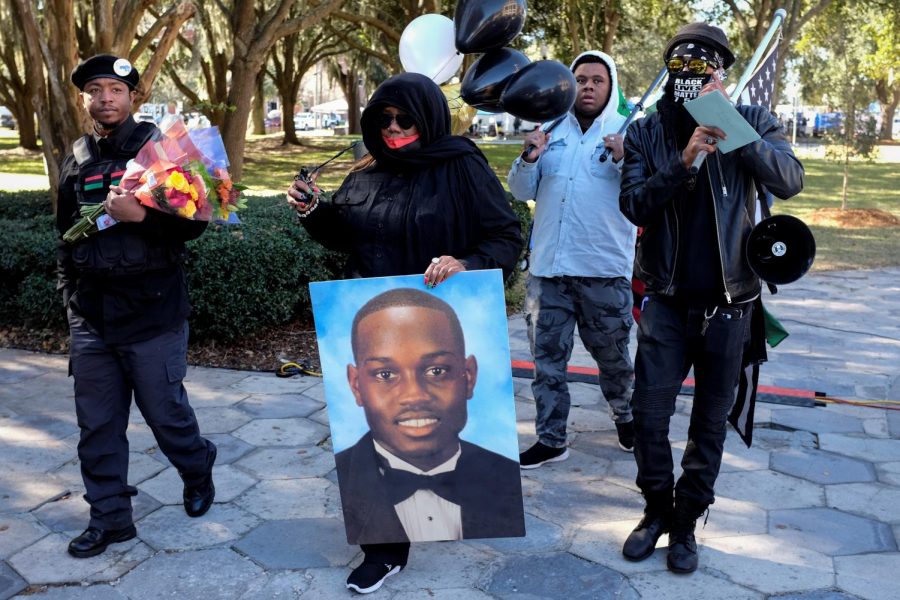Injustice persists despite Arbery verdict
The American legal system is still riddled with racism in spite of a just verdict being reached
December 2, 2021
On Feb. 23, 2020, 25-year-old Ahmaud Arbery was killed while jogging on the outskirts of Brunswick, GA. Arbery was shot twice in the chest, and also wounded in the wrist. This crime did not gain national attention until video footage of the incident was circulated on social media — two months had passed with no arrests made.
On Wednesday, Nov. 24, a jury found three white men — Travis McMichael, Gregory McMichael and William Bryan — guilty of Arbery’s death. They were also indicted on separate federal charges of hate crimes and attempted kidnapping, and they are expected to stand trial for these charges in February 2022. While this verdict represents a clear strike against systemic racism, racism was still present within the trial.
The jury was stacked with 11 white people and only one Black member, and the defense played heavily on ugly racial stereotypes.
The most explicit example of stereotyping came from Laura Hogue — an attorney for McMichael — who shocked observers when she said that Arbery was not a victim and described his “long, dirty toenails.” This statement displayed the pervasive view of Black people as lesser and unclean, and was entirely irrelevant to the case at hand and presentation of evidence.
Kevin Gough — Bryan’s lawyer — also repeatedly tried to ban “Black pastors” from attending the trial on the pretense that they were influencing the jury. The defense portrayed Arbery as a criminal and a burglar, simply because he jogged through a neighborhood that he didn’t inhabit and burglaries had occurred in the area in the weeks prior.
While the prosecution rightfully portrayed Arbery’s death as a baseless act of murder rather than self-defense, they did not explicitly mention race until their closing statements. Further, relevant evidence of the defendants’ racism was omitted from the presentation of evidence.
One of the three defendants uttered a racist slur moments after shooting Arbery, and one of the trucks on the scene — belonging to the McMichaels — had a vanity plate displaying the Confederate flag. The prosecution decided not to introduce this evidence into the trial in what they called a “strategic decision” that was likely made to appeal to the mostly white jury.
However, decades of social science research indicate that, when racial bias is highlighted in a trial, jurors tend to treat Black and white defendants more equally. Conversely, they tend to be more punitive against Black defendants when race is not highlighted.
In her opening statement, district attorney Linda Dunikoski told the jury “we are here because of assumptions and driveway decisions,” alluding to — but not explicitly citing — racial bias. Only in Dunikoski’s closing statement did she address race directly, telling the jury that the defendants “made assumptions because Ahmaud Arbery was a Black man.”
As is standard in court proceedings, the jurors were not allowed to seek information about the case outside of the courtroom. Thus they reached their verdict off of a limited story. Additionally, while Travis McMichael was found guilty on all counts, Gregory McMichael and Bryan were not found guilty of malice murder, and could one day be eligible for parole.
While the correct verdict was reached in this case, there is a trend emerging of juries being presented with limited information in cases of racial violence. The trend does not bode well for the legal and racial reform our country is in desperate need of.
The case of Trayvon Martin shared many similarities with Arbery’s case, and his killers were not convicted. Days before the Arbery verdict was reached, Kyle Rittenhouse — a white man who fatally shot two men in Aug. 2020 — was acquitted. While our legal system brought some justice to the Arbery family, it has failed so many other Black families.
Time and time again, verdicts such as these have been followed by complacency. Derek Chauvin was convicted of murder in the trial of George Floyd in June, and this conviction was not followed by reform. In fact, many states have taken steps backward by banning the teaching of critical race theory in schools.
This is not a time to be complacent — we must continue fighting for racial justice if verdicts such as these are to become the precedent. Undoing the damage caused by hundreds of years of systemic racism is not the responsibility of any one group or individual, but of our entire society.















